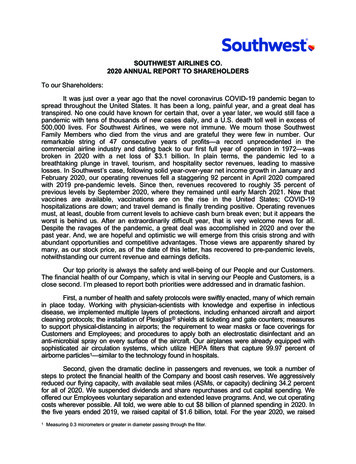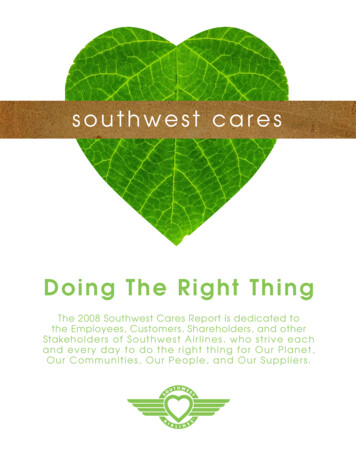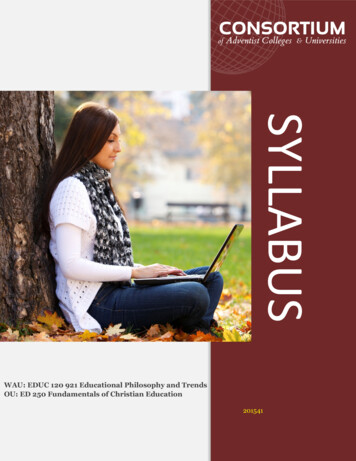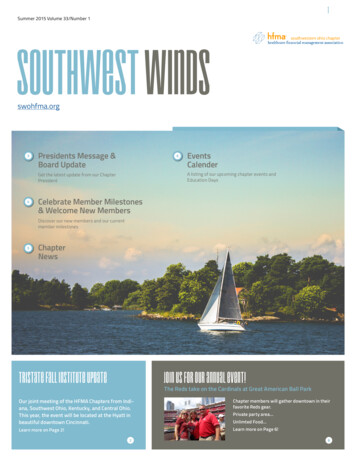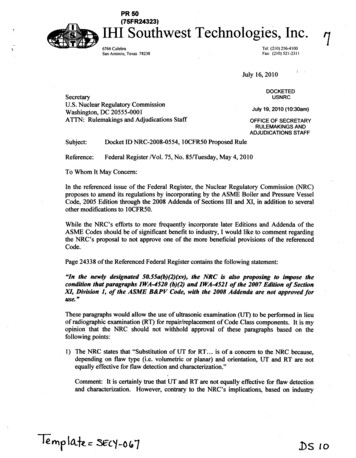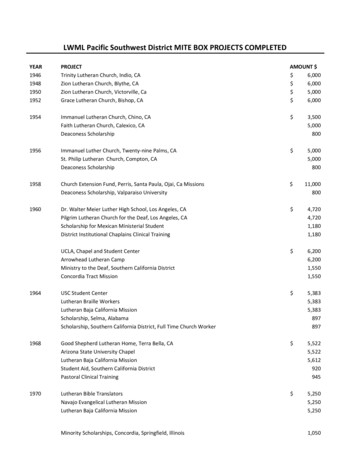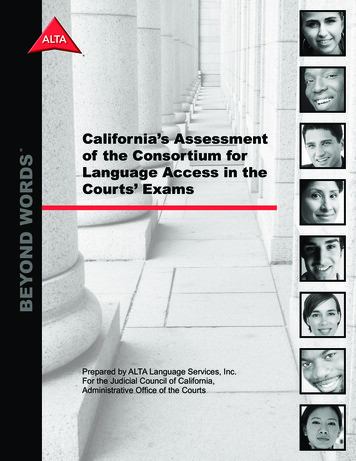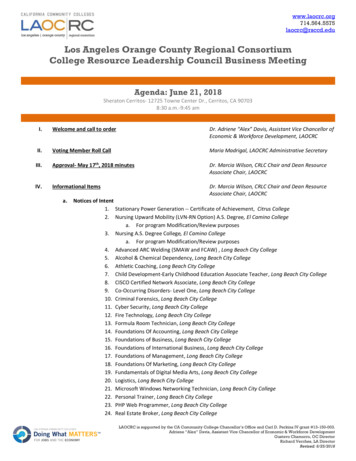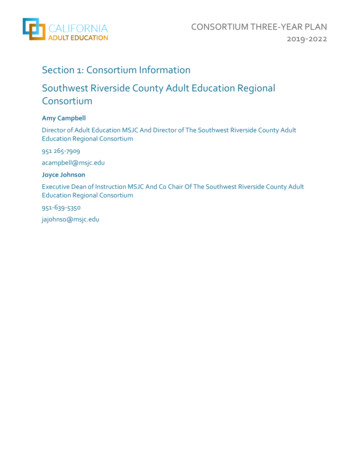
Transcription
CONSORTIUM THREE-YEAR PLAN2019-2022Section 1: Consortium InformationSouthwest Riverside County Adult Education RegionalConsortiumAmy CampbellDirector of Adult Education MSJC And Director of The Southwest Riverside County AdultEducation Regional Consortium951 265-7909acampbell@msjc.eduJoyce JohnsonExecutive Dean of Instruction MSJC And Co Chair Of The Southwest Riverside County AdultEducation Regional Consortium951-639-5350jajohnso@msjc.edu
Southwest Riverside County Adult Education Regional ConsortiumTable of ContentsSection 1: Consortium Information . iSection 2: Comprehensive Regional Three-Year Plan . 12.1 Executive Summary .12.2 Pre-Planning Assessment .2Table 1. Regional Service Providers .72.3 Community Need and Customers .82.4 Identifying Goals and Strategies.9Figure 1. Logic Model .9Table 3. Progress Indicators . 142.5 Piloting and Implementation .15
Southwest Riverside County Adult Education Regional ConsortiumSection 2: Comprehensive Regional Three-Year Plan2.1 Executive SummaryThe Southwest Riverside County Consortium has been committed to implementing andexpanding our promising programs to help adults acquire the skills necessary to prepare forcollege, career, and the workforce. Our consortium has worked toward reaching this goal overthe last three years by strengthening core academic skills through contextual learning, aligningresources to strategic goals, integrating career pathways framework into curriculum, includingvirtual learning if applicable, offering individualized multi-year professional development toadult educators, and providing student support services that reduce barriers to completion andadvancement to higher levels of future education and employment.The implementation and beginning of consortium wide career pathways benefited our entireregion in providing comprehensive services (academic and vocational) while avoidingpotentially unnecessary duplication of services. As we began developing these careerpathways, we worked with our partners and regional workforce data to receive input from allstakeholders and to align to high need current and future employment areas in our region. Weimplemented our website that contained our career pathways and provided our students,partners and members with information about our consortium programs and potentialcareer/higher education choices. We also offer many HSE, ESL, and CTE courses of study atthree correctional facilities within our region to help reduce recidivism.Our consortium steering committee members continue to meet monthly as we have over thelast four years. This open communication has supported us through periods of growth andhelped to strengthen our partnerships with all stakeholders. We continue to work cohesively,striving to improve our practice and push ourselves for the benefit of the students we serve.Annually over the last four years we have shared our progress and successes along with ourfuture plans with our partners and community members by hosting a community forum. Withour community forum, we are able to share our student successes while spotlighting upcomingplans and goals.Over the last three years our consortium has been able to implement regional commonassessments, a student information system, and professional development. Our consortiumhas also partnered with West-Ed, implementing entrance and exit surveys for all of ourstudents to track student input and progress. These areas of consistency have supportedgrowth, alignment of services, and data integrity. We are able to provide more seamlesstransitions for our students to move through the region within their educational goals. These2019-21 Consortium Three-Year Plan 1
Southwest Riverside County Adult Education Regional Consortiumcommon practices have also enabled us to begin to offer concurrent coursework for ourstudents transitioning into post-secondary education. Over the next several years we plan tofocus on and expand this area throughout our region. We also have implemented and focusedon student support services consortium wide. This includes counseling support providedthrough our community college member. These services, provided weekly to each member attheir respective programs, allow us to ensure all students have access to career andeducational counseling.As we continue to move forward, we look to our student data through West-Ed, CASAS, ASAPand our academic counseling staff to help us meet the needs of our students and our region.We have been able to meet many of our initial goals, and keep student needs in mind as weimplement long range goals for our next three year regional plan. Our strength remains in ourability to work as a team and continue to be student driven. From day one, our goal was not tojust reinvent what we had been, but to evaluate what we needed to become.2.2 Pre-Planning AssessmentAs we assess our capacity to support the adult population throughout our consortium, we lookto evaluate our current 2018-2019 levels of service and gaps in service.As a consortium, we have been very successful at building and sustaining a very strong offeringof High School/ High School Equivalency (HSE) and ESL courses throughout our entire region.We are focused on aligning these programs purposefully to ensure student needs are met andthat our programs remain as accessible and consistent through our consortium as possible. Wehave faced some challenges when aligning assessments, but overall by using CASAS as ourform of assessment for the last few years, we offer standardized programs with similarplacement and educational services. All of our consortium members offer HSE courses fundedthrough CAEP, WIOA, CalWORKs, LCFF, and community partner funding.ESL courses are offered through five of our consortium programs. When courses are notoffered through one of the K12 adult schools, our community college, MSJC, steps in whenasked to partner and provide ESL services. This partnership exists in four of our partneringconsortium K12 districts. The funding to support ESL classes comes from WIOA and CAEPfunding.An ongoing area of focus for our consortium is within the area of workforce training programsand coursework. Career and workforce training courses and certificate programs over the lastyear have expanded throughout our consortium. We now offer courses within seven of our ten2019-21 Consortium Three-Year Plan 2
Southwest Riverside County Adult Education Regional Consortiummember's programs. Although this was a large step forward in the last year, we still see this asa primary area of need to continue to grow and expand. Funding for these courses comes fromCAEP, WIOA, LCFF and community partner funding.Throughout our consortium, we have put an emphasis on workforce programs that lead intopost-secondary certificate and degrees or completion certificates leading into employment orapprenticeships. These courses include, for example, basic automotive, medical training, andthe building trades to name just a few. There was strategic planning used when creating thesecourse and certificate programs. Our consortium as a whole committed funds to offerings thatlead to post-secondary certificates and degrees, while also creating new courses that supportareas of need that we had not previously offered (see Table 1). Funding decisions wereconsistently aligned to Regional Labor Market and Local Workforce Development Board data.We also ensure that there is a constant focus on not offering repetitive courses within ourconsortium.Emphasizing support services to the students in our region has been a focus for us. Over a yearago, we implemented a model program of academic counseling consortium wide. We sharedthis program with the state as a Promising Practice.Our model includes academic counseling through the community college, where eachconsortium member is supported with a counselor on a weekly basis. Each consortiumprogram then has created a role for their counselor to support students as they finish theircoursework with their individual adult programs and create educational and work plans fortheir future. This counseling support service has also increased capacity among our region forfinancial aid access, career planning, and the successful transitioning of students. We continueto track data for the number of students that successfully obtain their educational and careergoals.We are fortunate that our consortium members represent all of our feeder K12 adult schools,our county office of education and our local community college in the region. All of our schoolsin our consortia offer HSE courses and are aligned to our community college. Four of ourmembers offer ESL programs, and seven of our members offer individual workforce training. Inaddition our Riverside County Office of Education offers programs that service ourincarcerated population.The Family Life Center, one of our strongest partners from the beginning, provides educationaland employment services while also being available to support our students by paying for GEDand HISET testing. They are able to provide these benefits for our students age 18-24. Inaddition, the American Job Centers of California (AJCC) also support our students with job2019-21 Consortium Three-Year Plan 3
Southwest Riverside County Adult Education Regional Consortiumtraining and placement for all students in legal residence. Other partners include the RiversideCounty Sheriff’s Association, which supports the jails with educational and career services andthe Riverside County Probation Department which supports HSE and CTE training at acommunity corrections site.Our consortium includes five members who are WIOA recipients. With these fundingrequirements, we find our entire consortium aligning within the WIOA guidelines. We havecollectively partnered with our local AJCC to support students transitioning between the twoprograms and their respective services. Through our local MOU we have put in place supportservices and practices that allow us to support student needs within our region. We have put ina place a counseling liaison to ensure consistency and constant communication when studentsare dual enrolled in both programs.MSJC, our community college member, is a recipient of Strong Workforce Program fundingthrough their CE department. All of our consortium members are also feeder K12 programswith MSJC as their local community college and share in the benefits from this funding. As weplan for new non-credit course offerings as pathway courses into certificate and degreeprograms, we can align into some of the new growth due to this funding. There is alsoopportunity in the future for more outreach support services.2019-21 Consortium Three-Year Plan 4
Southwest Riverside County Adult Education Regional ConsortiumKey Partners:PartnerOrganizationContact InformationVeronica AranaCity of Perrisvarana@cityofperris.orgObed AsifPatton State HospitalOBED.ASIF@dsh.ca.govValerie BackusMurrieta School DistrictVBackus@murrieta.k12.ca.usJoe BallewegTemecula Valley USDjballeweg@tvusd.k12.ca.usArrin BanksDPSSabanks@rivco.orgHilario BercillaAJCC PartnerHBercill@rivco.orgPat BrownSan Gorgonio Memorial Hospitalpbrown@sgmh.orgLisa CampbellMSJC CalWORKslcampbell@msjc.eduSara CrowderRCOEscrowder@rcoe.usLenore DeJesusFamily Life Center Partnerldejesus@cflckids.orgMaryann EdwardsTemecula Valley USDmedwards@tvusd.k12.ca.usWendy FrederickWorkforce Development RivCoWFrederick@RIVCO.ORGAmy GoeltzenleuchterBurlington Englishamy.g@burlingtonenglish.comMark HakeRiverside County Probationmhake@rcprob.usDr. Michelle HarperMSJC TEDS Departmentmharper@msjc.eduNeil KellyAEBG State Consultantnkelly@CCCCO.eduMike LaBrunoCarpenters Training FundMLaBruno@swcarpenters.orgRosa LazenbyRiverside County Sheriff Org.rlazenby@riversidesheriff.orgCindy Loo-GarciaASAP Tech. Supportcloogarcia@asapconnected.comAnthony LopezCherry Valley e.comAngelica LorenzanaMiravilla Care Centermvcc.don@miravillacarecenter.com2019-21 Consortium Three-Year Plan 5
Southwest Riverside County Adult Education Regional ConsortiumLarry MeissnewTotally Kids Rehabilitation Hospitallarry@totallykids.comMorris MeyersMSJCmmyers@msjc.eduRon MillerRiverside County Probationromiller@rivco.orgJennifer NiessAUMT PhlebotomyJennifer@aumt.orgEllyse PandjaitanCedar Mt. Post Acuteellysep@madison.careSara QuerubinHiSETsquerubin@ets.orgThea QuigleyRCCThea.Quigley@rcc.eduRichard RamirezAEBG Auto Instructorrramirez@msjc.eduJennifer RomeroTemecula Valley USDjromero@tvusd.k12.ca.usJeffrey ScottCarpenters Training FundJScott@swcarpenters.orgCharlotte SoteloPalm Grove Healthcaredsd@palmgrovehealthcare.comLeslie TrainorWorkforce Development RivCoLTrainor@RIVCO.ORGMark HakeRiverside County Probationmhake@rcprob.usMike VargasPerris Mayormvargas@cityofperris.orgCharles WalkerCity of Temeculacharles.walker@temeculaca.govTricia WhiteCCItrishiaw@condensedcurriculum.comJay WrightStudent Data Partner(Condensed Curriculum Institute)jwright@casas.org2019-21 Consortium Three-Year Plan 6
Southwest Riverside County Adult Education Regional ConsortiumTable 1. Regional Service ProvidersProvider NameProvider TypeAddress or location(s)where AE services areprovidedXYZ AgencyBusiness / Industry555 Adult Education Lane, LosAngeles, CA 90001Murrieta Valley Adult SchoolK-12 District24150 Hayes Ave.Hemet Adult SchoolK-12 District831 E. Devonshire Ave.Valley Adult SchoolK-12 District520 Chaney Street LakePerris Community Adult SchoolK-12 District418 West Ellis AvenueSan Jacinto Adult Education – Mt.K-12 District1000 N. Ramona Blvd.Temecula Valley Adult SchoolK-12 District32225 Pio Pico RoadMt. San Jacinto CollegeCom. College1499 N. State St., San JacintoBanning Adult SchoolK-12 District1151 West Wilson St.Beaumont Adult SchoolK-12 District1575 Cherry Ave.Riverside County Office of Ed.County Office3939 13th St., RiversideProgram AreasIf other, provide a briefdescription of services providedABEASEESLCTEAWDWRPAACSXXXXXXXXXYZ agency provides opportunities forstudents in Manufacturing Bridge Coursesto Job Shadow.2019-21 Consortium Three-Year Plan 7
Southwest Riverside County Adult Education Regional Consortium2.3 Community Need and CustomersAs illustrated in the following chart, the Southwest Riverside County region has 42% of its population with a high school diploma or below. Over 86,000 peopleover the age of 25 did not complete high school, so the need for a high school diploma/HSE is great. Across generations, 25% of each age group stopped goingto school after high school. Another 28% started college but didn't achieve a degree. Together, 70% of the region's population does not hold a college degree.Our counselors that offer transitional services into post-secondary help the many potential customers here with weekly service and support.This area has had 37% of its population receiving public assistance in the last 12 months. Though 10% in the region are consistently below poverty level, 18% ofthose who speak Spanish but little English are living consistently at or below poverty level. This is close to 11,000 people. 63% of those who speak Spanish athome have less than a high school diploma, but the unemployment rate is 4%. Therefore, the need is for ESL and ABE classes for these customers that workwith their busy schedules so they can get better paying jobs. The region offers evening classes with counseling during these hours. Counselors have alsocreated a resource guide that lists agencies providing other assistance. We align with the needs in this way. Career education options in the evening may be anarea for growth.Those aged 18 - 29 have the highest rates of unemployment, although more in their age groups have completed high school than their elders. This indicates anopening for college/career counseling, transition and support services, career technical education, on-the-job training, and apprenticeship opportunities. Ourworkforce readiness and range of career education offerings and certificate programs prepare students for employment. Our emphasis will be on the top fiveregional industry sectors; healthcare, manufacturing, logistics and transportation, construction, and renewable energy. Some of the region's top industry andjob needs were met with our CTE programs in 2018, with more under development that target specific areas of need.Of those who speak English less than "very well" -- 75,000 people -- the median age is around 40 years old. This shows a need for ESL classes for this age group,which includes parents of school-aged children. Regardless of the language proficiency, there are 61,000 people in our region who are not citizens of theUnited States. These potential students could utilize our classes to prepare for their naturalization interviews. Four agencies offer ESL classes during the day,including local community partners like elementary schools and libraries, and two offer citizenship courses.This data shows that our programs are in the right areas of student need. Every consortium member offers a pathway to high school completion. We areincreasing the number of Career Education options, with 7 of 10 agencies currently offering CTE training. The CTE courses currently support key industries suchas health care with medical billing and certified nursing, and also the building trades with welding and carpentry. Areas to grow include hospitality andinformation technology. Employers across industries ask us to send them people with soft skills who make trainable employees. Our programs seek to alignemployer expectations by including these skills in our curricula. As we pursue taking a more individualized approach to tracking student goals through theimplementation of the new individual learning plan (ILP), we will find out more accurately how well our career and educational programs align to the goals ofstudents.2019-21 Consortium Three-Year Plan 8
Southwest Riverside County Adult Education Regional Consortium2.4 Identifying Goals and StrategiesFigure 1. Logic ModelGoal Statement 1: Work toward the outcome of each individual student. Each student will have a student-identified goal Consortium-wideInputsActivitiesOutputsImmediate (Short-Term)OutcomesIn order to accomplish our set of activities wewill need the following:In order to address our problem or asset we willaccomplish the following activities:We expect that once accomplished, theseactivities will produce the following evidence orservice delivery:-Agency commitment-Counselor appointments-Student communication-Create and implement a-Students will haveaccomplished their desiredstudent tool for planningtheir educational, personal, personal goalsand career goals-Increase one-on-oneactivities for studentsupport and transitionIntermediate OutcomesLong-Term Outcomes /ImpactWe expect that if accomplished these activitieswill lead to the following changes in the nextyearWe expect that if accomplished these activ
May 14, 2019 · Executive Dean of Instruction MSJC And Co Chair Of The Southwest Riverside County Adult Education Regional Consortium. 951-639-5350. jajohnso@msjc.edu. . expanding our promising programs to help adults acquire the skills necessary to prepare for college, career, and the workforce.
